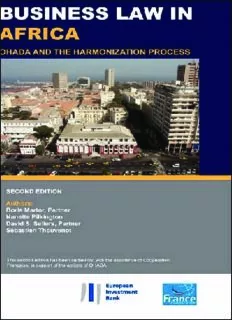
Business Law in Africa: Ohada and the Harmonization Process (Global Market Briefings) PDF
Preview Business Law in Africa: Ohada and the Harmonization Process (Global Market Briefings)
Business Law in Africa GLOBAL MARKET BRIEFINGS Business Law in Africa: OHADA and the Harmonization Process Second Edition Boris Martor Nanette Pilkington David S. Sellers SébastienThouvenot Publishers’note Every possible effort has been made to ensure that the information contained in thispublicationisaccurateatthetimeofgoingtopressandneitherthepublishers nor any of the authors, editors, contributors or sponsors can accept responsibility for any errors or omissions, however caused. No responsibility for loss or damage occasionedtoanypersonacting,orrefrainingfromaction,asaresultofthematerial inthispublicationcanbeacceptedbytheeditors,authors,thepublisheroranyofthe contributorsorsponsors. Usersandreadersofthispublicationmaycopyordownloadportionsofthematerial hereinforpersonaluse,andmayincludeportionsofthismaterialininternalreports and/or reports to customers, and on an occasional and infrequent basis individual articles from the material, provided that such articles (or portions of articles) are attributedtothispublicationbyname,theindividualcontributoroftheportionused andGMBPublishingLtd. Users and readers of this publication shall not reproduce, distribute, display, sell, publish,broadcast,repurpose,orcirculatethematerialtoanythirdparty,orcreate new collective works for resale or for redistribution to servers or lists, or reuse any copyrighted component of this work in other works,without the prior written permissionofGMBPublishingLtd. GMBPublishingLtd. HerefordHouse 23-24SmithfieldStreet 525South4th Street,#241 LondonEC1A9LF Philadelphia,PA19147 UnitedKingdom UnitedStatesofAmerica www.globalmarketbriefings.com FirstpublishedbyKoganPageLtd.in2002. Thissecondeditionpublishedin2007byGMBPublishingLtd. ©BorisMartor,NanettePilkington,DavidS.Sellers,SébastienThouvenot ISBN-13:978-1-84673-072-6 ISBN-10:1-84673-072-4 BritishLibraryCataloguinginPublicationData ACIPrecordforthisbookisavailablefromtheBritishLibrary LibraryofCongressCataloguing-inPublicationData Typesetin10/12ptNewCenturySchoolbookbyIntegraSoftwareServicesPvt.Ltd, Pondicherry,India PrintedbyTheOrientalPress,TheKingdomofBahrain Contents Foreword vi TheAuthors ix Introduction x 1 WhatIsOHADA? 1 2 Institutions 5 3 GeneralConsiderationsonOHADAUniformActs 16 4 GeneralCommercialLaw 29 5 CommercialCompaniesandEconomicInterestGroups 59 6 AccountingLaw 141 7 CollectiveProceedingsfortheClearingofDebts 147 8 Securities 178 9 ContractsfortheCarriageofGoodsbyRoad 215 10 SimplifiedRecoveryProceduresandEnforcementMeasures 234 11 ArbitrationLaw 259 12 TheLegalContextBeyondOHADA 285 AppendixA: EssentialItemstoConsiderBeforeInvestinginan OHADAMemberState 301 AppendixB: InvestmentCodesintheOHADAMemberStates 305 AppendixC: MapsandChartofRegionalOrganizations 307 AppendixD: RCCMForms 310 AppendixE: UsefulAddressesandWebsites 318 Glossary 321 Bibliography 330 Index 339 Foreword ThepublicationofabookinEnglishdealingwithOHADAisaveryimportant event. The idea of harmonizing the law was first proposed by the Ministers of FinanceoftheFrancZoneatameetinginOuagadougou,wheretheyvoiced theirawarenessthatthesituationasitexistedatthattimewasoneoflegal andjudicialuncertaintythatwashardlyconducivetoinvestment.Asaresult, they decided in 1991 to appoint a high-level working group to try to find a solutiontotheproblem. After many months of research and of contacts with theAfrican author- ities,theworkinggroupbecameconvinced,asaresultofitslengthyinvesti- gations,thatitwasnecessarytoproceedwiththeharmonizationofbusiness lawwithintheframeworkoftheestablishmentofastateoflaw.Initsview,if suchaprojectcouldbebroughtintobeing,thiswouldhavebeneficialconse- quences,inparticularwithregardtothepossibilityforeachStatetohaveat itsdisposalmodernlegislationevenintheabsenceofthenecessaryhuman resources,tobenefitfromcross-borderexchanges,delocalizationandcompe- tition,toenjoylegalandjudicialsecurityand,inaword,tobenefitfromthe returnandenhancementofinvestmentasaresultoftherestoredconfidence ofeconomicoperators. Thisharmonizationwasallthemorenecessarygiventhatexamplestaken inparticularfromcompanylawandfromthesystemofcollectiveinsolvency proceedingsclearlyshowedthatthelegislativeactivitythathadbeenunder- takenbytheStatesofFrench-speakingAfricaaftertheirindependencehad led to disparities that were prejudicial to the establishment and growth of businesses. Sincethe1980s,certainStateshadundertakenandachievedthemodern- ization of their legislation, whereas others had remained with the Code Napoléon, dating from 1807, together with a law on sociétés anonymes and a law on sociétés à responsabilité limitée dating from 1867 and 1925, respectively. There can be no doubt that this situation was counter-productive within thecontextofeconomieswhoseambitionwastoachieveintegration. Butinadditiontothedisparities,therewasalsouncertaintyastotheexact contours of the body of law from one country to another, and even within single countries. Other subjects of concern were the inadequate training in business law that had been received by judges and other legal officers, the difficulties in exploiting cross-border resources, and the need to find a solutiontotheproblemsoflandlockedcountries. On the basis of these findings,the working group considered that it was necessarytoestablishanauthoritytoissuethenewlaw,acourttoapplyit, acentreforthetrainingandfurtherspecializationofjudgesatahighlevel and a streamlined administrative body to coordinate the operations of the variousinstitutions.Inaword,aneworganizationhadtobecreated. Foreword vii TheideasputforwardbytheworkinggroupweresubmittedtofourHeads of State,seven Prime Ministers,some 40 Ministers,Presidents of National Assemblies and of Economic Councils, Presidents of Supreme Courts and other high-level judges, presidents of bar associations and of chambers of commerce,personsinchargeofinternationalorganizationsandbusinessmen ofallnationalities.Onallsides,theideaswerewelcomedfavourablyandeven enthusiastically. ThesameideaswerethendiscussedatmeetingsofMinistersofJusticeand duringseminarsandroundtablesorganizedwiththeassistanceofspecialists inbusinesslaw. TheOHADAinstitutionsarethefollowing: • theCouncilofMinisters; • theCommonCourtofJusticeandArbitration(CCJA); • thePermanentSecretariatand • theRegionalTrainingCentreforLegalOfficers(ERSUMA). Infact,OHADAisalegaltoolforeconomicintegrationanddevelopment: economicintegrationbecausetherecanbenoeconomicintegrationwithout legalintegration. Legal integration is what OHADA is achieving. The simplification and harmonization of the applicable law, both on the legislative plane and in courtdecisions,andthecertaintythatitengendersareconsideredasfactors that will stimulate growth by encouraging economic operators to invest in Africa. Untilnow,bothnationalandforeigneconomicoperatorswerehaltedbythe legalandjudicialinsecuritythatwasprevalentintheFrancZonecountries. It is to be hoped that the unification of laws and the unification of court decisionswillhavetheexpectedeffects. Although OHADA was conceived in a French-speaking area, African leadershavequicklycometounderstandthatthispricelesstoolofeconomic integration should be extended to other countries. Guinea-Bissau and Equatorial Guinea soon became members, and now, with the advent of NEPAD, OHADA’s extension to English-speaking African countries is inevitable. ThefriendsofOHADAwhobelieveinitssuccesshavefoundedanassoci- ation for the unification of law inAfrica called UNIDA.Any individuals or companieswhoareofthesameopinionareinvitedtojoinUNIDA. UNIDAhassetitselftheaimsofsupportingOHADAinitsactivitiesandin particular of spreading knowledge of its harmonized law throughoutAfrica andelsewhere. It is true that OHADA was conceived by the financial authorities of the French-speaking area. But ever since its creation in Libreville in 1992, OHADA has been open to all African countries without any linguistic discrimination. viii Foreword The publication at this time of a book in English on this important institution for legal integration, which was originally designed for French- speaking Africa and which is without any doubt the prelude to economic integration,is clearly a major event in the life of OHADA;and on behalf of UNIDA,Icanonlyapplauditwithenthusiasm. Thisiswhy,astheformerPresidentoftheSteeringCommitteethatwas responsiblefordrawingupthefirstOHADAlegaltexts,andasthePresident of UNIDA, I wholeheartedly support the welcome initiative that has been takenofpublishingthisnewbook,whichshouldbeofgreatassistanceboth asaresearchtoolandasameansofspreadingknowledgeandunderstanding ofOHADAlaw,thefuturelawoftheUnitedAfricathathassorecentlybeen createdbytheHeadsofState. JudgeKébaMbaye† PresidentofUNIDA(AssociationforaUnifiedSystemofBusinessLaws) FormerPresidentoftheSteeringCommittee responsiblefortheimplementationoftheOHADAProject † Thisforewordwasoriginallypublishedinthefirsteditionofthisbook,publishedin2002. Sadly, Judge Mbaye, who was the driving force behind the creation of OHADA, and who continuedtogiveithiswholeheartedsupportinhiscapacityasPresidentofUNIDA,passed awayon11January2007.Theauthorsdedicatethisneweditionasatributetohismemory, inthehopethatitwillassist,howevermodestly,inpromotingthelegalintegrationthatJudge Mbayeconsideredanessentialprerequisiteforachievingeconomicintegrationanddevelopment inAfrica. The Authors • BorisMartor,AvocatàlaCourdeParis • NanettePilkington,AvocatàlaCourdeParis • DavidS.Sellers,Solicitor,England&Wales,AvocatàlaCourdeParis • SébastienThouvenot,AvocatàlaCourdeParis,Docteurendroit aremembersoftheprojectsteamintheParisofficeofEversheds.Theyhave advised both investors and governments on major infrastructure projects and the settlement of disputes in a wide variety of African countries and withaparticularemphasisontheOHADAMemberStates. Eversheds is an international law firm with offices in the UK, Europe, the Middle East and Asia. The Paris office of Eversheds was established over40yearsago,underthenameFrereCholmeley.Itiswellknownforits businesslawpractice,bothinFranceandabroad,aswellasforinternational arbitrationandpublicinternationallaw. This book has been written in close collaboration with twoAfrican legal experts: • AdesegunA.Akin-Olugbade,GeneralCounseloftheAfricanDevelopment Bank • Dr Martha Simo Tumnde, née Njikam, Barrister and Solicitor of the SupremeCourtofCameroon,andHeadofDepartmentofLawandDean of the Faculty of Social and Management Sciences, University of Buea, Cameroon The authors also thank Séverine Hatchuel-Benne, Pauline Roullet de La BouillerieandSylvaineWalter,allofEversheds,fortheirvaluableassistance inpreparingthissecondeditionforpublication.
Description: